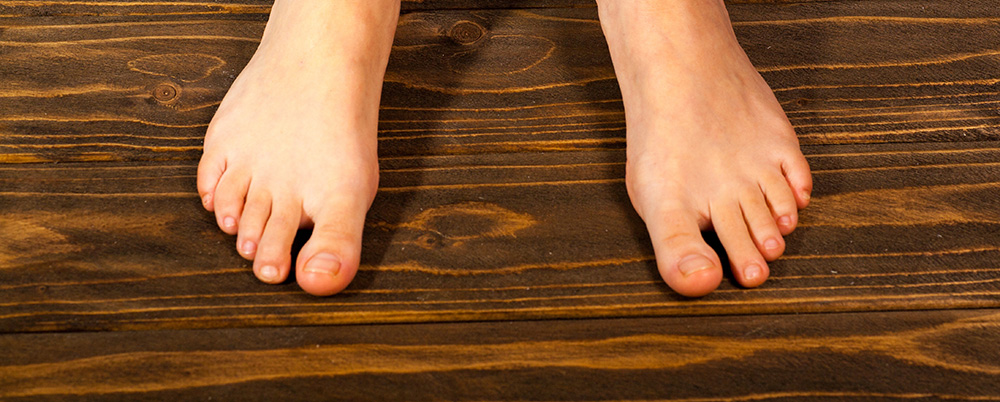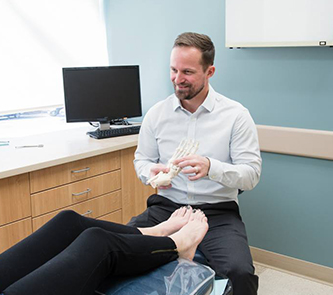Ingrown Toenails & Warts
Just think about it. We often force our feet into the dark, enclosed, semi-damp environment of shoes for much of the day. But even when we allow them to be free, they’re still on the front lines against the world, potentially coming into contact with pathogens and other harmful substances (such as coffee table legs).
It’s not an ideal world for our toenails and the skin of our feet, and problems can and often do develop. Among these can be pesky conditions such as ingrown toenails and warts. Just about everyone will experience one of these conditions at least once in their lifetime.
While these conditions can sometimes be taken care of at home, the professional help of a podiatrist can make for an easier experience. There are also certain situations when it’s definitely best to come see us for help!
Ingrown Toenails

When you have an ingrown toenail, you most likely know it. As the nail curves and digs into the surrounding skin, it often causes pain, tenderness, and redness. If you’re unlucky, the site can even become infected!
There are several reasons why an ingrown toenail may develop:
- Trimming toenails too short can encourage the skin surrounding the nail to begin folding over the nail. Best practice is to cut relatively straight across, with just a slight curve.
- Wearing too tight shoes can force the skin against the toenail, causing a painful nail border.
- A toe injury or fungal infection may cause a period of improper growth.
- Genetics may sometimes make one’s nails grow in a more curved fashion, making them more susceptible to an ingrown nail.
The best treatment for an ingrown toenail may depend on the severity of the case. Many minor ingrown nails can be treated easily at home by soaking the foot in warm water with Epsom salt for 15 minutes several times each day and gently separating the nail.
It will also help to take a look at your shoes and purchase a better-fitting pair, if needed.
When should you see a podiatrist about an ingrown toenail?
- If an ingrown nail is painful, is oozing pus, or has redness and soreness that seems to be spreading, you might have an infection and should contact us right away.
- If you have diabetes or poor circulation, it is best to have any type of sore or infection on your feet treated professionally (check here to see if your nail care is covered) .
- For some people, ingrown toenails just keep recurring. This may be due to genetics or an injury. In these cases, when other methods of treatment have not prevented them, partial surgical removal of the nail (matrixectomy) may be recommended.
Plantar Warts
A plantar wart signals the invasion of a virus just beneath the skin of your foot, often through a small cut or opening in the skin.
While this virus in itself tends to be mostly harmless, it can create hard, flat, rough bumps where it dwells. You might also see little pinpoints of black, sometimes called “seeds.” (Note: These are not seeds and you should not try to pick them out. They are actually small blood vessels that have grown into the wart.)
We already know warts come from a virus, but how does that virus spread? Usually it’s picked up by coming into contact with another’s warts, or by walking barefoot in areas where the virus can thrive, such as locker rooms or around public pools.
The virus itself is not extremely contagious, but it’s best not to risk yourself in areas of high exposure. Children and teenagers also tend to be more susceptible to infection.
Plantar warts do tend to go away on their own, but this can take a very long time. Sometimes plantar warts will disappear only to reappear again later on.
And yes, we know about duct tape and other home remedies for warts. There is no problem in trying them if you are not cutting yourself or otherwise causing additional harm. There is just not a lot of scientific evidence that supports these methods are being effective at this time.
When should you see a podiatrist about plantar warts?
- Plantar warts can sometimes be painful, especially if developing in high-pressure areas such as the heel. Pain is never something you should have to endure, and is always worth seeing us about!
- Your warts persist, keep returning, or multiply.
- You have diabetes or poor circulation in your feet.
- The wart is bleeding or changes in appearance or color.
Treatments for warts may involve applications of medicine to dry out the wart or anti-viral medications that destroy the wart. Laser treatments and minor surgical procedures could also be considered.
Keeping Your Feet in the Clear and Pain-Free
Plantar warts and ingrown toenails are just a couple skin and nail conditions that can happen on the feet. Whether you are having trouble with them, black toenails, blisters, corns and calluses, or many other problems, Northeast Foot and Ankle is here to help!
Our offices in Nashua and Portsmouth are just a phone call away. Contact us at (603) 431-6070 or use our online contact form to schedule an appointment.
Pay Your Bill
Make a payment online through our payment portal or Care Credit!
Portsmouth Office
14 Manchester Square, Suite 250
Portsmouth, NH 03801
Nashua Office
17 Riverside Street, Suite 205
Nashua, NH 03062
Website Hosted by SC Digital



